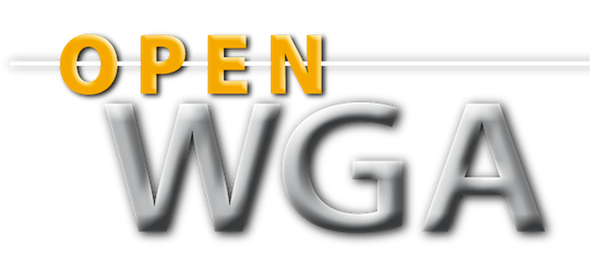OpenWGA 7.5 - OpenWGA Concepts and Features
PublishingURLs
| Variable | Meaning |
|---|---|
| <areaname> | Name of a website area |
| <contentid> | Any identification key for a content document. See details below. |
| <context> | Context path of OpenWGA as J2EE web project |
| <ctitle> | Title of a content document |
| <dbkey> | Database key |
| <dwnkey> | Key of a temporary download |
| <fcid> | Any identification key of a document containing file attachments. See details below. |
| <fname> | Name of a file attachment on a document |
| <layoutname> | Name of a WebTML module |
| <mediakey> | Media key |
| <resname> | Name of some other resource |
| <scriptname> | Name of a script module |
Content key, normal and complete format
<structkey>.<langcode>.<versnr>
Content key, format for released documents
<structkey>.<langcode>.0
<structkey>.<langcode>.<mediakey>
Unique Name (on page or individual content)
<uname>.<langcode>.<mediakey>
The following are "incomplete" <contentid>s that will be accepted but redirected to a full format. A language may be chosen automatically by browser-configured languages:
Structkey only:
<structkey>
Unique Name (on page or individual content), language-unspecific:
<uname>
Unique Name plus language in obsolete "Webgate"-Format:
<uname>-<langcode>
The <fcid> may be any valid complete or incomplete <contentid>, if a content document should be addressed, or a file container name if a file container should be addressed. Colons contained in file container names may instead be specified as slashes in the <fcid> to support relative URLs between resources from different file container levels.
Resources of an OpenWGA web application
Complete. Content will be rendered by the specified layout:
http:// ... /<context>/<dbkey>/<mediakey>/<layoutname>/<contentid>
Complete. Content will be rendered by the standard layout of its content type:
http:// ... /<context>/<dbkey>/<mediakey>/default/<contentid>
Short. Is redirected to the complete format with "default" as layout name:
http:// ... /<context>/<dbkey>/<mediakey>/<contentid>
Short. Is redirected to the complete format with media key "html":
http:// ... /<context>/<dbkey>/<layoutname>/<contentid>
Short. Is redirected to the complete format with media key "html" and "default" as layout name:
http:// ... /<context>/<dbkey>/<contentid>
Displaying content documents - title path formats (available when title path URLs are enabled for the application):
Normal title path, qualified by web area name
http:// ... /<context>/<dbkey>/<areaname>/<ctitle>/../<ctitle>.<language>.<mediakey>
Normal title path including document key, qualified by web area name. Only tthe content id will be used to retrieve the contents. Titles are ignored:
http:// ... /<context>/<dbkey>/<areaname>/<ctitle>/../<ctitle>~<contentid>.<language>.<mediakey>
Shortened title path, qualified by the title of a root document in a configured "Title path URL shortcut area"
http:// ... /<context>/<dbkey>/<ctitle>/../<ctitle>.<language>.<mediakey>
Title path versions prior to OpenWGA 5.1 without language. Will be redirected to full format after a language has been chosen automatically based on browser-configured languages:
http:// ... /<context>/<dbkey>/<areaname>/<ctitle>/../<ctitle>.<mediakey>
http:// ... /<context>/<dbkey>/<ctitle>/../<ctitle>.<mediakey>
Displaying WebTML modules "contextless"
Complete. The language is the main context language (a "dummy" context), used for example to generate URLs to other pages:
http:// ... /<context>/<dbkey>/<mediakey>/<layoutname>.<language>.<mediakey>
Short versions. Are redirected to the complete format with media key and an automatically chosen language based on browser-configured languages:
http:// ... /<context>/<dbkey>/<layoutname>
http:// ... /<context>/<dbkey>/<layoutname>.<mediakey>
Publishing file attachments:
Normal format, usable for all file attachments:
http:// ... /<context>/<dbkey>/file/<fcid>/<fname>
Special format, usable only for attachments on content documents
http:// ... /<context>/<dbkey>/<mediakey>/<layoutname>/<contentid>/~file/<fname>
Publishing CSS/JavaScript modules
http:// ... /<context>/<dbkey>/css/<scriptname>
http:// ... /<context>/<dbkey>/js/<scriptname>
Other special URL formats:
Calling the home page of an OpenWGA application:
http:// ... /<context>/<dbkey>
Calling the login page for an OpenWGA application (more precisely: its domain):
http:// ... /<context>/<dbkey>/login
Logging out of an OpenWGA application (more precisely: its domain):
http:// ... /<context>/<dbkey>/logout
Obsolete URLs for changing the "preferred language" which does not exist any more. Now merely call the addressed content document.
http:// ... /<context>/ ... /~changelanguage
http:// ... /<context>/ ... /~changelanguage:<langcode>
Resources of the user session
Files attached to a WebTML form. Uses the internal process ID of the form and the individual file name:
http:// ... /<context>/tmlform/<processid>/<filename>
Retrieving temporary downloads for the current session. Uses a download key generated for this download:
http:// ... /<context>/tempdwn/<dwnkey>
Internal resources of OpenWGA
http:// ... /<context>/static/<respath>
Experimental WebTML Debugger:
http:// ... /<context>/tmldebug
Retrieving the browser favicon configured in OpenWGA:
http:// ... /<context>/favicon.ico
URL to preferred application for content management:
http:// ... /<context>/contentmanager
Administrative resources
http:// ... /<context>/*.jsp
OpenWGA admin client (redirect):
http:// ... /<context>/wgadmin
http:// ... /<context>/admin
WGA4 admin page (redirect):
http:// ... /<context>/wga4admin
OpenWGA introductional start pagehttp:// ... /<context>/start
Publishing OpenWGA scheduler logs for WGA4 admin pagehttp:// ... /<context>/joblog
"Statiic WebTML" in context of a content document:
Normal format. Resourcen name is a name of a static WebTML module (distributed as JSP page in OpenWGA server):http:// ... /<context>/statictml/<dbkey>/<resname>/<contentid>
Administrative form with master login rights. Only possible with administrative login:http:// ... /<context>/admintml/<dbkey>/<resname>/<contentid>
"Static WebTML" contextless:
Normal format. Resourcen name is a name of a static WebTML module (distributed as JSP page in OpenWGA server):http:// ... /<context>/statictml/<dbkey>/<resname>
Administrative form with master login rights. Only possible with administrative login:http:// ... /<context>/admintml/<dbkey>/<resname>
Special URLs for POST requests:
Posting forms for domain logins:http:// ... /<context>/login
Logging out of a domain via POST:http:// ... /<context>/logout
Target URL for AJAX-enabled WebTML actions containing formular data:http:// ... /<context>/ajaxform
OpenWGA SOAP Webservice interfacehttp:// ... /<context>/services -
Special URL parameters
Forcing a file attachment to be downloaded (rather than displayed as image or otherwise interpreted by the browser):
http://....../some/fileattachment.txt?forcedownload=true
Scale images to a specified maximum pixel height and/or width. Image is scaled down to match maximum height and width while keeping ratio:
http://....../some/image.png?maxheight=pixels
http://....../some/image.png?maxwidth=pixels
Querying for a file derivate of the adressed file instead of the original file. The best matching derivate will be served instead of the original. If no derivate matches the request fails with HTTP error code 412:
http://....../some/image.png?derivate=derivateQuery
Force generation of classic content URLs instead of title path URLs on a WebTML request:
http://..../some/webtml/request?forceClassicURL=true
Redirect to login page if we are browsing anonymously and the requested resource is not retrievable:
http://.../some/contenturl?login
Force binary output of a file to publish, omitting internal transcoding of the content to the OpenWGA publishing encoding (which only happens if OpenWGA regards the contents to be text):
http://.../filecontainer/file.txt?binaryOutput
